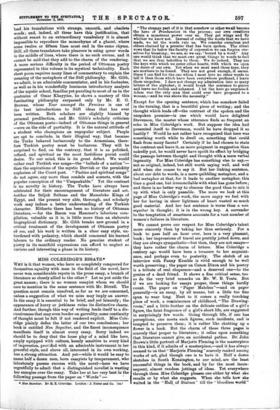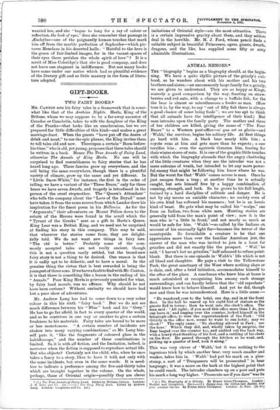MISS COLERIDGE'S ESSAYS.*
WRY is it that women, who have so completely conquered for themselves equality with man in the field of the novel, have never won considerable repute in the prose essay, a branch of literature so closely allied to the other ? Let us put aside the great names ; there is no woman essayist whom we should care to mention in the same sentence with Mr. Birrell. The question must remain unsolved, so far as we are concerned, unless a suggestion of what we miss may imply an answer. In the essay it is essential to be brief, and yet leisurely ; the appearance of hurry or jerkiness ruins its distinctive charm. And further, though this way of writing lends itself to a dis- cursiveness that may even border on garrulity, some continuity of thought must be felt if not rendered explicit. Miss Cole- ridge plainly defies the latter of our two conclusions; her book is entitled Non Sequitur, and the finest inconsequence manifests itself in almost every essay. Sorry indeed we should be to deny that the loose play of a mind like hers, amply equipped with culture, keenly sensitive to every kind of impression, provided with an admirable instrument in her graceful style, and above all, interested in its own working, has a strong attraction. And yet—while it would be easy to name half a dozen men, born essayists by temperament, who laboriously pursue success with the novel—here we have regretfully to admit that a distinguished novelist is wasting her energies over the essay. Take her at her very best in- the following passage from the paper on " Words " • Son Sequitur Br AL V. Coleridge London : J Nisbet and Co 100
• • • •
"The strange part of it is that somehow or other we all become the hero of Frankenstein in the process; our own creations obtain a monstrous power over us. They get wings and fly whither we know not. Instead of ruling the words that we have made, we let the words rule us. We consider ourselves and others chained by a promise that has been spoken. The silnt vows that lie below the faculty of expression we can forgive our- selves for breaking; we are, as we say, 'bound by a word.' Any one would think that we must owe great things to words to feel that we are thus beholden to them. We do indeed. They are the keys with which we enter other hearts, with which we open the doors of our own. Yet when we most need these keys, they are nowhere to be found. They are not good enough, it seems. Since I can find for the one whom I most love no other words to tell it than those which have been everywhere 'profaned, I leave them unspoken. I dare not change my admiration into so many letters of the alphabet; it would break the sentence to pieces and leave me foolish and ashamed. I let the hero go unpraised. Adam was the only man that could ever have proposed to a woman,—and he was above the necessity."
Except for the opening sentence, which has somehow failed in the turning, that is a beautiful piece of writing; and the thought which leads off—the contrast of the spoken and the unspoken promise—is one which would have delighted Stevenson, the master whose utterance finds so frequent an echo in Miss Coleridge's work. But suppose the idea had presented itself to Stevenson, would he have dropped it so hastily ? Would he not rather have recognised that here was something worth while to dwell on, something that - could flash from many facets? Certainly if he had chosen to state the contrast and leave it, as more poignant in suggestion than
nakedly put, he would never have spoilt its effect by bridging the passage between thought and thought with a mere verbal
ingenuity. For Miss Coleridge has something else to say,— not so original, indeed, but still worth saying well, and well said when she comes to say it. But her linking sentence, about our debt to words, is a mere quibbling metaphor, and a bad metaphor at that, for it leads to another metaphor, this time a good one, but irreconcilable with what has gone before; and there is no better way to obscure the good than to mix it up with what is only passable. The more we look at this page of Miss Coleridge's work, the more angry we feel with her for having in sheer lightness of heart wasted so much a material. And her last sentence is worse than a non
sequitur in thought; it is in the wrong key. A surrender to the temptation of smartness accounts for a vast number of women's failures in literature.
We cannot prove our respect for Miss Coleridge's talent more sincerely than by taking her thus seriously. For a book to pass half an hour over, hers is a very pleasant, book ; her impressions of travel are prettily jotted down, and they are always sympathetic—but then, they are not essays— they have rather the charm of letters. Mies Coleridge a century ago would have been a treasure to her, acquaint- ance, and perhaps even to posterity. The sketch of an interview with Fanny Kemble is vivid enough to be Well worth preserving ; the paper on Canon Dixon and his poetry is a tribute of real eloquence—and a deserved one—to the genius of a dead friend. It shows a fine critical sense, too
as do the very brief remarks on Mr. W. B. Yeats. But if we are looking for essays proper, these things hardly count. The paper on "Paper Matches "—and on paper generally—is an essay, by all means, but a little too fine spun to wear long. Next to it comes a really touching piece of work, a reminiscence of childhood, "The Drawing. room," and a little further on the delicate outline of a girl's figure, the faint fragrance of a girl's short life; are suggested in surprisingly few words. Going through life, if one has perceptions, one meets such figures, such incidents, and is tempted to preserve them ; it is rather like shutting up a flower, in a book. But the charm of these three pages is scarcely that proper to literature ; it relies upon something that literature cannot give, an accidental pathos. Dr: John Brown's little portrait of Marjorie Fleming is the masterpiece in this kind, if it admits of a masterpiece,—and it has always seemed to us that" Marjorie Fleming" scarcely ranked among works of art, glad though one is to belie it. Half a dozen sketches in South Kensington, to our mind, are the least successful things in the book, and by far the most incon- sequent, almost random jottinge of ideas. Yet everywhere through them Miss Coleridge pleases one either by what she
1 recalls or by what she suggests. When she tells how she waited in the "Hall of Statues" till the "bloodless world"
■
wearied her, and she "began to long for a ray of colour or reflection, the look of eyes," does she remember that passage in /Eschylus—one of the poignantly human touches that mark him off from the marble perfection of Sophocles—which pic- tures Menelaus in his deserted hails: "Hateful to the hero is the grace of fair-limbed images, for in the vacant spaces of their eyes there perishes the whole spirit of love" ? It is a merit of Miss Coleridge's that she is good company, and does not leave one stagnant in indifference. But not many books have come under our notice which had so plentiful evidence of the literary gift and so little mastery in the form of litera- ture adopted.























































 Previous page
Previous page